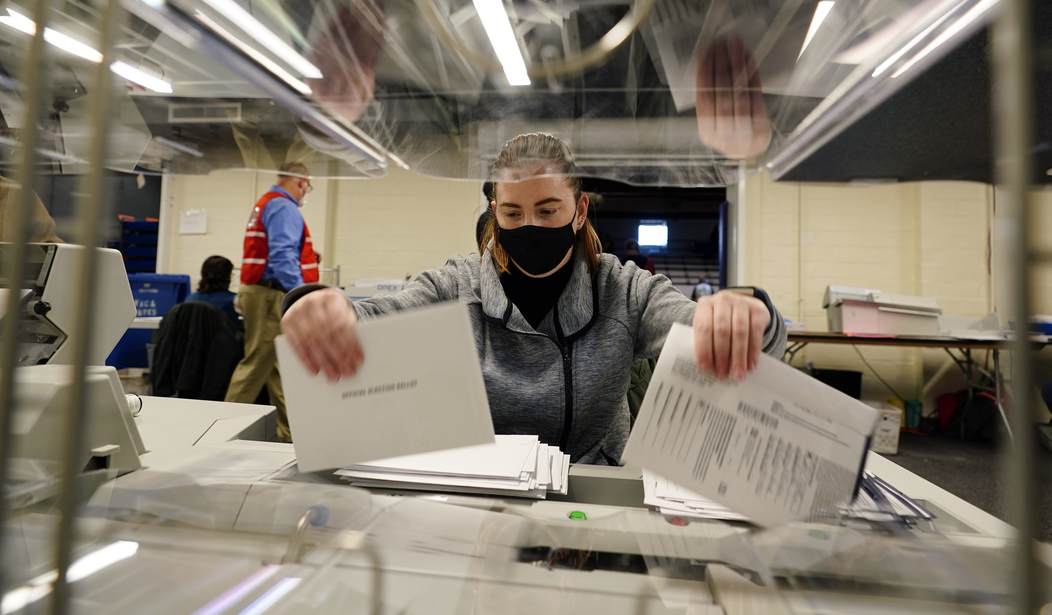As I noted in this story earlier today, Defendants were ordered by federal District Court Judge Matthew Brann to file any motions to dismiss the new lawsuit filed by the Trump Campaign by 5:00 pm today.
There are literally two dozen or more motions to intervene or file amicus briefs that have been lodged with the court, as well as motions to dismiss filed by the Secretary of the Commonwealth, Katherine Boockvar.
The nature of the allegations of the complaint filed by the Trump Campaign is that Boockvar gave “guidance” to various County Boards of Elections that they could engage in certain practices in the manner in which the handled “mailed-in” ballots, and some of those practices allowed some voters to be notified that their ballot may be defective and subject to being rejected by the County Boards. The Biden Campaign then took information on the identity of those voters, contacted them on election day, and instructed them to go to their polling precinct and cast a provisional ballot which would be counted if their mailed-in ballot was rejected.
The Complaint alleges that these actions were in violation of the express provisions of Pennsylvania election law, and the disparate treatment of voters from one county to another, and even within counties in some instances, constituted a violation of the due process and equal protection rights of other Pennsylvania voters who had cast legally sufficient ballots by diluting their vote.
In just quickly glancing through some of the motions to dismiss, there seem to be two key aspects to a common theme. First, the plaintiffs lack standing as they cannot prove a specific and particularized injury to themselves. Second, the doctrine of “abstention” requires a federal court to wait for challenges alleging state law violations to be addressed first in state court, and the Plaintiffs have not pursued remedies in state court.
The Pennsylvania Attorney General’s Office — assisted in great measure I’m certain by the Washington DC office of Kirkland & Ellis — seems to have cranked out the most comprehensive brief in support of the motion to dismiss. I’ll save for a later article a more comprehensive view of the argument they make, but it seems clear that the strategy here is to play for time — to attempt to draw out the resolution of this dispute, in either state court or federal court, to a point in time where the Pennsylvania vote count must be certified or a risk begins to set in that Pennsylvania may not be able to name Electors to the Electoral College by the date specified by federal law.
First, the State argues the Court should abstain from resolving the state law questions that are part of the federal claims while there are state court proceedings still underway, or on issues of state law the Plaintiffs could litigate in state court. There is a case currently pending before the Pennsylvania Supreme Court on a state law question that could obviate some or all of the federal constitutional claims. Further, the State claims that there is in place as part of the comprehensive election code a process for challenging provisional ballots — including provisional ballots cast by voters seeking to “cure” potential mail-in ballot defects. The state election code also has a provision for comprehensive challenges to the outcome of all election contests, and the Plaintiffs should be required to avail themselves of that process before coming to federal court for relief.
Second, the State claims the Plaintiffs lack standing because their claims are merely generalized grievances resting “conjectural theories of supposed harm requiring multiple leaps of logic.” Plaintiffs’ assertion that, because some counties did not permit their preferred form of canvass observation, the Commonwealth’s elections were over-run with fraud has already been rejected as purely speculative and legally unsupportable.
Third, the State claims the complaint fails to state plausible claims regarding the refusal to provide their canvass watchers with their preferred form of access, or (ii) allowing voters to cast provisional ballots or otherwise remedy defective mail-in ballots. The plaintiffs’ assertion that the Secretary and county boards improperly usurped legislative power in violation of the Constitution’s Elections and Electors Clauses fails where the Secretary and county boards lawfully exercised discretion afforded them by the General Assembly in the Election Code.
Fourth, the extraordinary relief sought by the complaint is not permitted in either law nor equity. If the Court were to bar the certification of Pennsylvania’s election results and deny the democratic will of nearly 7 million Pennsylvanians, such relief would be substantially disproportionate to the “garden-variety irregularities alleged in the Complaint.” Indeed, while the canvassing of mail-in ballots was ongoing, the Trump Campaign notably only challenged the breadth of their access in one county—even though Pennsylvania law provides ready access to courts to resolve such issues on Election Day. Nor has the campaign exhausted the Election
Code’s prescribed county-level process for challenging provisional ballots, including such ballots cast by voters whose mail-in ballots were rejected, all of which counsels against the radical federal intervention sought here.
I like the last one — “Well, the ‘irregularities were just ordinary, so no need to figure out what might have actually taken place — no harm, no foul.”
The Plaintiffs’ response to these various motions is due on Sunday.
I’ll have a closer look at these motions, and the specifics of the allegations made in the complaint in a forthcoming story.














Join the conversation as a VIP Member